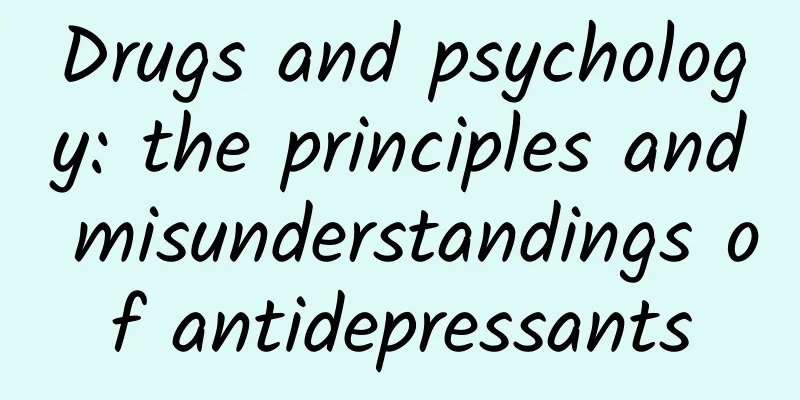Drugs and psychology: the principles and misunderstandings of antidepressants

|
In the field of modern medicine, antidepressants have become an important means of treating mental illnesses such as depression. However, there are often many misunderstandings about antidepressants in the public's understanding and knowledge. This article aims to introduce the principles of antidepressants and clarify common misunderstandings in a popular science way to help everyone better understand and use these drugs. 1. The principle of antidepressants The main principle of antidepressants is to improve mood by regulating neurotransmitters in the brain. Neurotransmitters are chemical messengers in the brain that are responsible for transmitting information. In the brains of people with depression, the content or function of certain neurotransmitters (such as serotonin and norepinephrine) may be unbalanced, leading to symptoms such as low mood and loss of interest. Antidepressants modulate the levels or functions of these neurotransmitters through different mechanisms. For example, selective serotonin reuptake inhibitors (SSRIs) increase serotonin transmission by inhibiting its reuptake, thereby increasing its concentration in the synaptic cleft. Tricyclic antidepressants work by blocking the reuptake of multiple neurotransmitters. It usually takes several weeks for these drugs to work because they gradually change the balance of neurotransmitters in the brain, so when you start taking an antidepressant, you may have to wait a while before you start to see an improvement in your symptoms. 2. Misconceptions about antidepressants 1. Myth 1: Antidepressants have serious side effects, so people are afraid to use them Many people are concerned about the side effects of antidepressants, believing that these drugs can cause damage to the body. However, in fact, the side effects of most antidepressants are relatively mild and usually appear in the early stages of medication and gradually subside over time. Of course, different drugs and different individuals may have different reactions. Therefore, when using antidepressants, patients should follow the doctor's advice, take the medicine according to the prescribed dosage and usage, and promptly report any discomfort or abnormal reactions to the doctor. 2. Myth 2: Frequent dressing changes can improve treatment outcomes Some patients may frequently change medications if they feel that the effect of antidepressants is not good after taking them for a period of time. However, this practice does not necessarily improve the treatment effect. Each antidepressant has its own unique pharmacological action and onset time. Frequent medication changes may lead to drug interactions and adverse reactions, and may also cause patients to miss the best time for the drug to take effect. Therefore, in the early stages of treatment, patients should give the drug enough time to work and make necessary adjustments under the guidance of a doctor. 3. Myth 3: You can stop taking the medicine once your condition improves Some patients may think they are cured after their condition improves, and stop taking medication immediately. However, this practice may lead to a relapse. Depression is a disease that is prone to relapse, and even after the symptoms are relieved, some pathological changes may still exist in the patient's brain. Therefore, sufficient maintenance treatment is essential to consolidate the therapeutic effect and prevent relapse. Patients should gradually reduce the dosage of medication under the guidance of a doctor, rather than stopping the medication suddenly. 4. Myth 4: The more expensive the antidepressant, the better Price is not the only criterion for measuring the effectiveness of antidepressants. Different drugs have different mechanisms of action and indications, and patients should choose the appropriate drug based on their own conditions and the doctor's advice. In addition, some expensive antidepressants may not be suitable for all people, such as pregnant women, the elderly, or patients with other diseases. Therefore, when choosing an antidepressant, patients should comprehensively consider the safety and effectiveness of the drug as well as their own financial situation. 5. Myth 5: Antidepressants can make people stupid or addicted Some people worry that antidepressants will affect intelligence or cause addiction. In fact, antidepressants do not make people stupid or cause addiction. The function of these drugs is to regulate the balance of neurotransmitters in the brain and improve emotional state, rather than affecting intelligence or causing dependence. Of course, any drug needs to be used under the guidance of a doctor to avoid abuse or improper use. 6. Myth 6: Antidepressants are “happy pills” that make people happy instantly Many people mistakenly believe that antidepressants can help people get rid of depression and become happy immediately, just like "happy pills". In fact, antidepressants are not drugs that directly produce a sense of happiness, but gradually improve depression symptoms by regulating the balance of neurotransmitters in the brain. Therefore, when taking antidepressants, patients need to wait patiently for the drugs to work, rather than expecting immediate results. Conclusion Antidepressants play an important role in the treatment of mental illnesses such as depression. However, there are often many misunderstandings about the public's understanding of antidepressants. Through the introduction of this article, we hope that everyone can have a deeper understanding of the principles and mechanisms of action of antidepressants, clarify common misunderstandings, and use these drugs more rationally. At the same time, when using antidepressants, patients should follow the doctor's advice and guidance to ensure the safety and effectiveness of the medication. In addition, in addition to drug treatment, patients with depression should also pay attention to psychotherapy and lifestyle adjustments to comprehensively improve treatment effects and quality of life. Author: Bai Jinxia, Department of Pharmacy, Zhongmou County People's Hospital |
<<: The alarm is ringing, but I advise you to sleep a little longer!
>>: Coronary stents: a new chapter in the treatment of coronary heart disease
Recommend
How long can a woman live with nephritis?
Nephritis can happen to anyone and is one of the ...
Treatment of uterine pelvic effusion
Pelvic effusion is a common gynecological disease...
How painful is it on the third day after taking the induction medicine?
How painful is it on the third day after taking t...
All examination items for female infertility
Miscarriage makes women suffer terribly, and habi...
What should I pay attention to when I have frequent urination and painful urination during menstruation?
Nowadays, more and more women suffer from physica...
Is there a better way to enlarge breasts?
A woman's breasts are the most typical female...
What is the function of dried scallop porridge? How to make dried scallop porridge delicious
On weekdays, if you pay attention to your health,...
How to deal with the rainy season? These six tips will teach you how to prevent moisture during the rainy season!
During the rainy season, the rain is continuous. ...
Is it normal to have excessive discharge during menopause?
When female friends enter menopause, their ovaria...
Uterine leiomyoma
Many friends do not know what uterine leiomyoma i...
Curing chronic hepatitis B in children transmitted vertically from mother to child is no longer a dream!
Xixi, who is over three years old, is a cute pet ...
How much does a shot of blocking antibody cost?
If a woman has a history of miscarriage, she need...
How to treat cervical warts?
There are many diseases that are transmitted thro...
How many days can I know I'm pregnant by taking a blood test?
Most women who are preparing for pregnancy know h...
What to do if you have flat breasts?
Women with normal breasts cannot experience the p...





![[Medical Q&A] Why should diabetic patients pay more attention to their feet?](/upload/images/67f0e3a5d9f87.webp)



